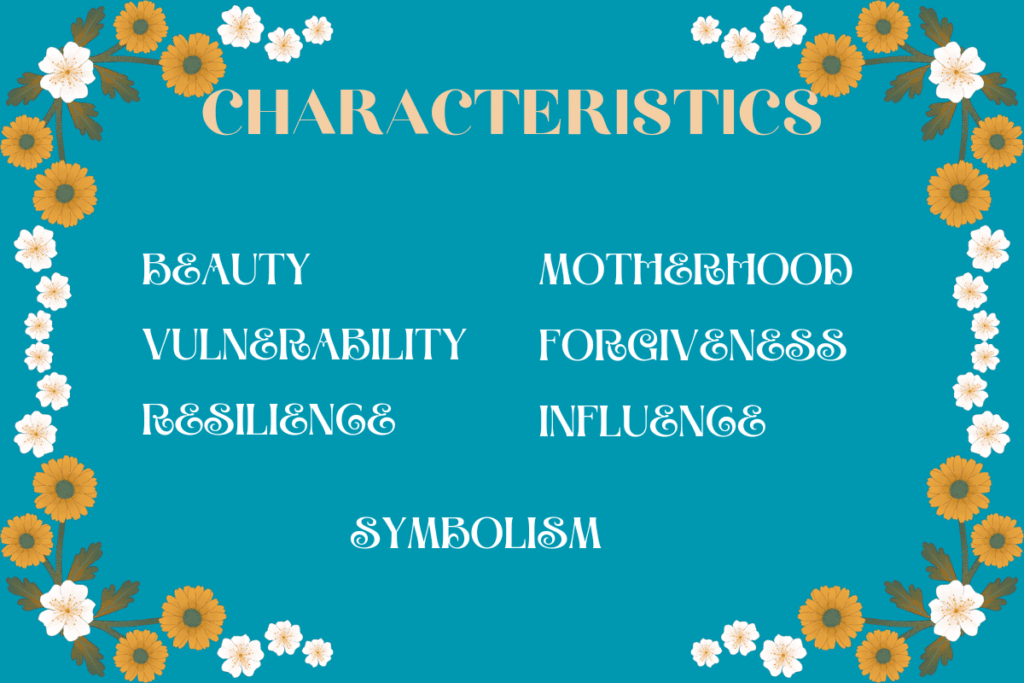BEAUTIFUL BATHSHEBA IN THE BIBLE
“The name Bathsheba בַּת־שֶׁ֣בַע (bat šeḇaꜥ) comes from a combination of the Hebrew words בַּת (bat), which means “daughter,” and the Hebrew word שׁבע (sheva⁽), which literally means “seven” but comes to mean “to bind with an oath,” creating the new meaning “daughter of the oath” or “daughter of abundance”.
Bathsheba in the Bible, is entwined in a narrative of power, morality, and redemption. Her tale, marked by adultery, bloodshed, and tragic consequences, unfolds as King David succumbs to lust, leading to the death of her husband Uriah.
Despite being portrayed as lacking agency, Bathsheba’s actions secure her son Solomon’s succession to the throne, showcasing a subtle influence in the making of a king. Through her story, Bathsheba in the Bible embodies the complexities of human nature, divine justice, and the enduring themes of sin and redemption, resonating with readers across centuries.

Bathsheba in the Bible, as the wife of Uriah the Hittite, yet it is her pivotal encounter with King David that propels her into biblical prominence. Amidst the grandeur of ancient Israel’s courts, Bathsheba’s allure captivates King David, leading to a tragic saga of adultery, murder, and divine retribution.
Despite her initial passive role, Bathsheba’s influence subtly emerges as she secures her son Solomon’s succession to the throne, embodying themes of sin, repentance, and redemption. Through her tale, Bathsheba epitomizes the complexities of power, morality, and divine justice, resonating across generations with profound insights into human nature.
Bathsheba’s Marriage to Uriah
Bathsheba in the Bible, the wife of Uriah the Hittite, captivates King David’s attention while bathing on her rooftop, sparking an adulterous affair despite her marital commitment to one of David’s loyal soldiers. This scandalous liaison triggers a series of tragic events that define Bathsheba’s life and influence the fate of a nation.
From the initial encounter to the birth of Solomon, Bathsheba’s story in the Bible intricately weaves themes of power, sin, repentance, and redemption, portraying a complex interplay of human nature, divine justice, and the enduring consequences of moral transgressions.

Uriah’s Death
In a desperate attempt to conceal his adulterous affair with Bathsheba in the Bible, King David orchestrates the death of her husband Uriah, a loyal soldier in David’s army. David orders Uriah to be placed on the front lines of battle, with instructions for his fellow soldiers to withdraw, leaving Uriah exposed and vulnerable to enemy attack.
Uriah’s subsequent death at David’s command casts a dark and tragic shadow over Bathsheba’s newfound relationship with the king, setting the stage for divine intervention and the unfolding of consequences that will shape the destiny of Israel’s monarchy.
Nathan’s Rebuke
The prophet Nathan confronts King David with a parable that vividly exposes his sin, leading to a powerful moment of repentance and divine judgment. Through Nathan’s rebuke, Bathsheba’s innocence is implicitly vindicated, as David is forced to acknowledge his transgressions and face the consequences of his betrayal.
This pivotal interaction highlights the intricate interplay between sin, repentance, and divine justice, underscoring the timeless themes of accountability, redemption, and the profound impact of moral choices on individuals and nations.
Solomon’s Birth
Despite the tumultuous events surrounding her, Bathsheba’s resilience shines through as she gives birth to Solomon, who later ascends to the throne as king of Israel. Solomon’s reign symbolizes a time of prosperity and stability, yet it is Bathsheba’s unwavering strength in the face of adversity that molds his character and leaves a lasting imprint on his legacy.
Through her enduring presence and influence, Bathsheba not only secures her son’s succession but also plays a pivotal role in shaping the future of the kingdom, embodying a narrative of perseverance, redemption, and the enduring power of a mother’s love.

Legacy of Bathsheba in the Bible
The story of Bathsheba in the Bible serves as a powerful cautionary tale, illustrating the consequences of unchecked desire and the redemptive power of divine grace. Her pivotal role during King David’s reign underscores the complexities of human relationships and the enduring impact of our choices on future generations.
Bathsheba’s narrative is marked by adultery, bloodshed, and tragic consequences, yet it also reveals themes of sin, repentance, and restoration. Through her story, Bathsheba emerges as a complex figure, whose subtle influence shapes the destiny of Israel’s monarchy, embodying the profound insights into human nature and the workings of divine justice.
Bathsheba in the Bible, in Jewish Tradition
In Jewish tradition, Bathsheba in the Bible is depicted as a tragic figure entangled in the complexities of royal intrigue and prophetic rebuke. Talmudic literature and Jewish folklore present diverse interpretations of her character, yet her role as the mother of Solomon is universally acknowledged.
Despite the differing portrayals, Bathsheba’s enduring significance lies in her pivotal role in the lineage of King Solomon, emphasizing her importance in biblical history and the lineage leading to Jesus Christ.
Bathsheba in the Bible, in Christian Tradition
In Christian tradition, The story of Bathsheba in the Bible has been a source of profound artistic and theological exploration. Her portrayal as a symbol of temptation and redemption has captivated theologians and artists alike, inspiring countless depictions in paintings, sculptures, and sacred texts. Bathsheba’s narrative invites contemplation on the complex themes of sin, forgiveness, and the human condition.
Through her story, she emerges as a multifaceted figure, embodying both the vulnerability of being caught in the machinations of power and the resilience to overcome adversity. Bathsheba’s enduring legacy in Christian art and literature underscores the timeless relevance of her story, which continues to resonate with audiences seeking to understand the nature of divine grace and the transformative power of repentance.
Lessons from Bathsheba in the Bible
The story of Bathsheba in the Bible offers several valuable lessons that readers can learn from:
- Consequences of Actions: Bathsheba’s affair with King David resulted in severe consequences, including the death of her husband, Uriah, and the loss of their child. Her story serves as a reminder that our actions, even those done in secrecy, can have far-reaching consequences that affect not only ourselves but also those around us.
- Power Dynamics: Bathsheba’s vulnerability as the wife of one of King David’s soldiers highlights the unequal power dynamics at play in relationships. Her story underscores the importance of recognizing and addressing power imbalances to prevent exploitation and harm.
- Forgiveness and Redemption: Despite the pain caused by David’s actions, Bathsheba in the Bible ultimately forgives him after he confesses his sins and seeks redemption. Her capacity for forgiveness demonstrates the transformative power of grace and the importance of extending forgiveness, even in the face of betrayal.
- Resilience in Adversity: Bathsheba’s ability to endure adversity with strength and dignity serves as a model of resilience. Despite facing public scandal and personal loss, she continues to navigate the challenges of her circumstances with grace and perseverance.
- Motherhood and Legacy: Bathsheba’s role as the mother of Solomon highlights the profound influence that parents can have on their children’s lives. Her guidance and support contribute to Solomon’s rise to kingship and underscore the importance of nurturing and empowering future generations.
- Seeking Justice: Bathsheba’s actions in seeking justice for herself and her family, as evidenced by her appeal to King David and the intervention of the prophet Nathan, emphasize the importance of standing up for what is right and seeking accountability for wrongdoing.
- Lessons in Leadership: Bathsheba’s influence on Solomon’s reign as king reflects the role that wise counsel and guidance can play in leadership. Her support and guidance contribute to Solomon’s success as a ruler and highlight the importance of surrounding oneself with trusted advisors.
Overall, The story of Bathsheba in the Bible offers timeless lessons about the complexities of human relationships, the power of forgiveness and redemption, and the importance of resilience and integrity in the face of adversity.
Feminist Interpretations
Recent feminist scholarship on Bathsheba in the Bible has significantly revised traditional views of her character, shifting from passive victim or seductress to a more empowered figure. These scholars emphasize Bathsheba’s agency in the face of adversity, showcasing her resilience and determination in the midst of oppression.
This reevaluation highlights her active role in navigating the complex power dynamics between King David and herself, as well as her ability to adapt and survive in a male-dominated society. By focusing on Bathsheba’s agency, feminist scholars offer a more nuanced understanding of her character, challenging traditional patriarchal interpretations and offering a more empowering narrative.
Characteristics of Bathsheba in the Bible

Bathsheba in the Bible, a prominent figure, possesses several notable characteristics that shape her role in biblical narrative and influence interpretations of her story:
- Beauty: Bathsheba in the Bible is described as exceedingly beautiful, capturing the attention of King David as she bathes on her rooftop. Her physical attractiveness plays a crucial role in the events that unfold in her life.
- Vulnerability: Despite her beauty, Bathsheba in the Bible finds herself in a vulnerable position when King David summons her to his chambers and initiates an adulterous affair. This vulnerability stems from her subordinate status as the wife of one of David’s soldiers.
- Resilience: Despite the challenges she faces, including the loss of her husband and the public scandal surrounding her affair with David, Bathsheba in the Bible demonstrates resilience in the face of adversity. She continues to navigate the complexities of her situation with strength and grace.
- Motherhood: Bathsheba in the Bible becomes the mother of Solomon, who goes on to become one of Israel’s greatest kings. Her role as a mother shapes the trajectory of Solomon’s life and underscores the importance of her lineage in biblical history.
- Forgiveness: Bathsheba in the Bible exhibits forgiveness towards King David after he confesses his sins and seeks redemption. Despite the pain caused by his actions, Bathsheba extends forgiveness, illustrating the power of reconciliation and grace.
- Influence: Bathsheba’s influence extends beyond her personal relationships, impacting the political landscape of ancient Israel. Her son Solomon ascends to the throne and establishes a prosperous reign, influenced by Bathsheba’s guidance and wisdom.
- Symbolism: Bathsheba’s story serves as a symbol of temptation, redemption, and the complexities of human relationships. Her experiences resonate with universal themes of love, betrayal, and forgiveness, making her story relevant across cultures and generations.
These characteristics collectively contribute to Bathsheba’s enduring legacy in biblical literature and her significance as a figure of moral and spiritual significance.
Conclusion
Bathsheba’s narrative transcends time, resonating with universal truths about human nature, faith, and forgiveness. Whether seen as a victim or a heroine, her story inspires contemplation on the complexities of power, morality, and redemption.
Bathsheba’s legacy serves as a poignant reminder of the enduring consequences of choices and the transformative power of grace. Across cultures and generations, her tale prompts reflection on the interplay of sin and repentance, offering profound insights into the human experience and the unwavering presence of divine mercy in the face of adversity.
Reference
Unique FAQ’s
- Was Bathsheba punished for her adultery?
- While Bathsheba faced consequences for her actions, such as the loss of her husband and the public scandal surrounding her affair with David, the biblical narrative does not explicitly detail any specific punishment inflicted upon her.
- Did Bathsheba have any other children besides Solomon?
- The Bible does not mention any other children born to Bathsheba and David besides Solomon, who went on to become one of Israel’s greatest kings.
- What lessons can we learn from Bathsheba’s story?
- Bathsheba’s story teaches us about the dangers of unchecked desire, the consequences of our actions, and the power of redemption and forgiveness in the face of adversity.
- How has Bathsheba been depicted in art and literature throughout history?
- Bathsheba has been portrayed in various ways in art and literature, often as a symbol of beauty, temptation, and redemption. Artists and authors have drawn inspiration from her story to explore themes of love, betrayal, and forgiveness.
- Why is Bathsheba’s story still relevant today?
- Bathsheba’s story resonates with contemporary audiences because it speaks to universal themes of love, betrayal, redemption, and forgiveness that are timeless and continue to shape human experience.


1 thought on “22. BEAUTIFUL BATHSHEBA IN THE BIBLE”